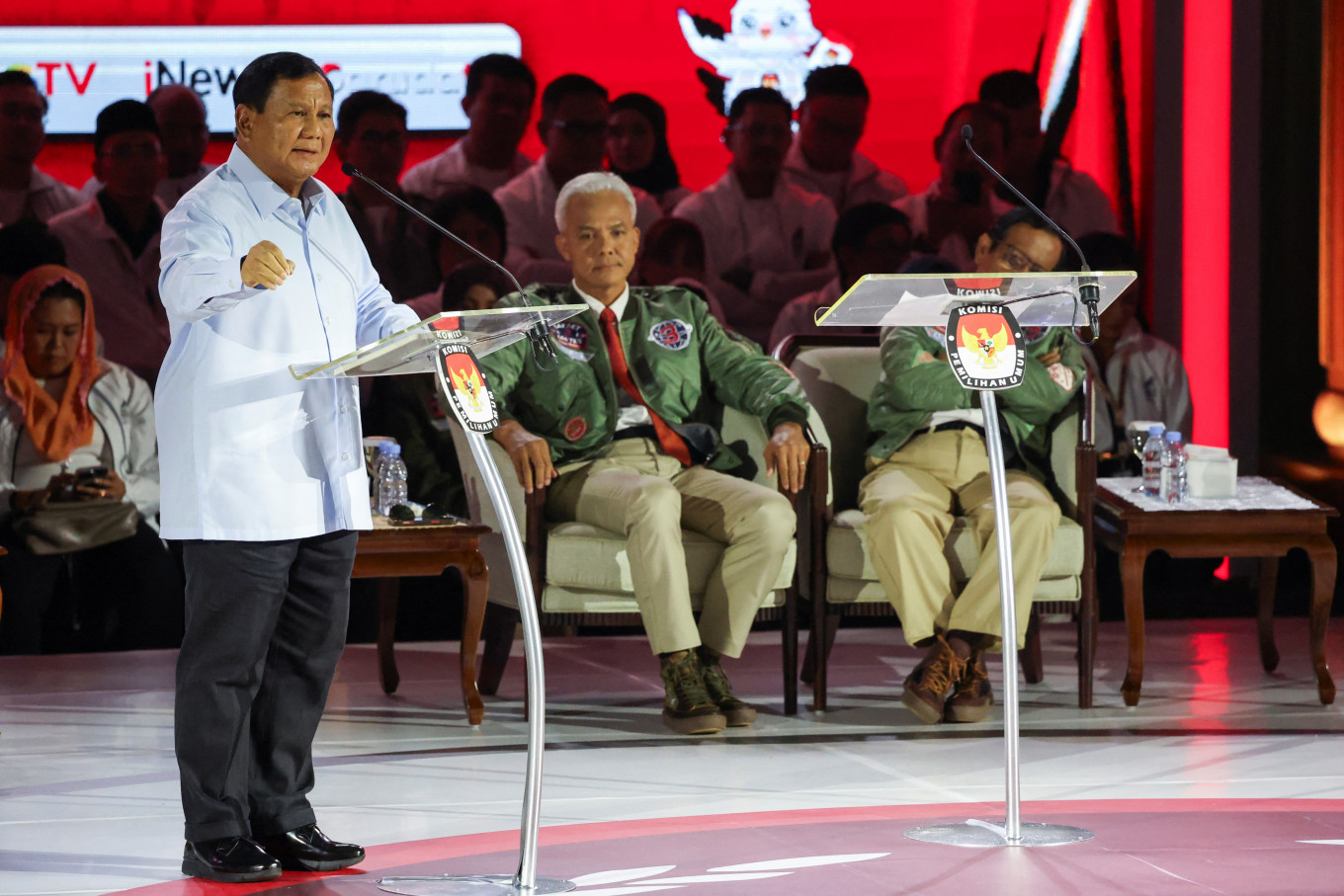Popular Reads
Top Results
Can't find what you're looking for?
View all search resultsPopular Reads
Top Results
Can't find what you're looking for?
View all search resultsA defensive debate
Amid a myriad of global crises, from geopolitical competition, rising protectionism and nationalism to armed conflicts and global warming, voters wanted to hear what the three presidential candidates had to offer to improve the outlook.
Change text size
Gift Premium Articles
to Anyone

Given the state of the world today, it’s no overstatement to say that Sunday’s presidential debate was one of the most – if not the most – consequential electoral debates of our current election cycle.
Amid a myriad of global crises, from geopolitical competition, rising protectionism and nationalism to armed conflicts and global warming, voters wanted to hear what the three presidential candidates had to offer to improve the outlook.
The Sunday night debate, which focused on global politics, defense and security, was of particular note because the current presidential frontrunner, Defense Minister Prabowo Subianto of the Gerindra Party, found himself on the defensive.
Just days before the debate, a spokesperson for Prabowo broke the news that his ministry’s plan to purchase 12 secondhand Mirage 2000-5 fighter jets from Qatar had been “delayed”.
It was an embarrassment for Prabowo’s camp, not least because the purchase was intended as a stopgap solution as the country awaits the delivery of 42 Rafale jets that the ministry bought in 2022.
The competing camps pounced on the delay, with presidential candidate Ganjar Pranowo of the Indonesian Democratic Party of Struggle (PDI-P) saying that buying used fighter jets from overseas was nothing to be proud of in the first place.

And in the lead-up to the debate, Ganjar’s campaign surrogates focused on what they said were the inflated price tags of the fighter jets.
Only minutes after the debate kicked off, Prabowo found himself defending his tenure as defense minister against an unsurprising opening salvo from opposition candidate and former Jakarta governor Anies Baswedan.
In his opening statement, Anies criticized Prabowo’s spending spree in the position, saying that while billions of dollars had gone toward state-of-the-art weaponry, a large number of Indonesian Military (TNI) personnel lacked adequate housing.
Later in the debate, Anies admonished Prabowo for a cyberattack against his ministry last year.
"It is ironic that the Defense Ministry was targeted by hackers in 2023 [...], and this is a ministry with a Rp 700 trillion budget," Anies told Prabowo.
Beyond the personal back-and-forth between Prabowo and Anies, the Sunday night debate revealed the three candidates’ contrasting approaches to international politics.
Prabowo, with his military background and direct exposure to international diplomacy, is an inveterate political realist who places primacy on assertive foreign policy backed by military muscle.
He frequently reiterated his perspective that Indonesia should buy more and better weapons systems as its primary means of dealing with an increasingly volatile world. He even cited the slow progress on negotiations on the Code of Conduct in the South China Sea as a reason to buy more weapons.
Anies, on the other hand, has a soft spot for soft power, which he said could improve Indonesia's standing in the world. The former Jakarta governor also revealed an institutionalist bent, championing ASEAN as the best way to address tensions in Southeast Asia.
Ganjar stood between his two rivals on the issue. He outlined a more case-by-case approach to global politics and was willing to go beyond ASEAN, which he criticized as being too cumbersome. Nonetheless, he had no qualms with relying on technical institutions like the National Cyber and Encryption Agency (BSSN) to deal with escalating cyberattacks.
The three candidates offered three contrasting views on global politics at Sunday’s debate. If viewers can cut through the noise of the personal attacks, they will see the starkly different policy packages and temperaments available to them and can make up their own minds who is fittest for the nation’s highest office.










